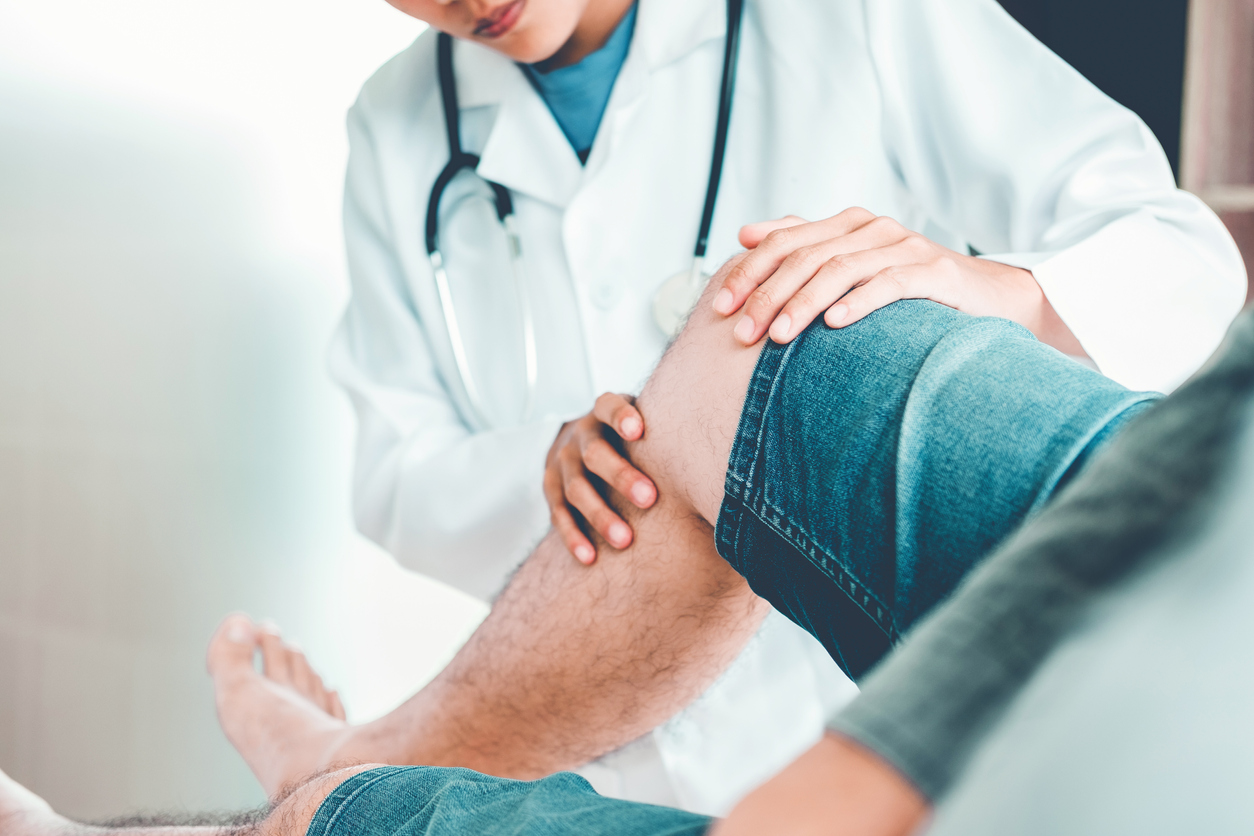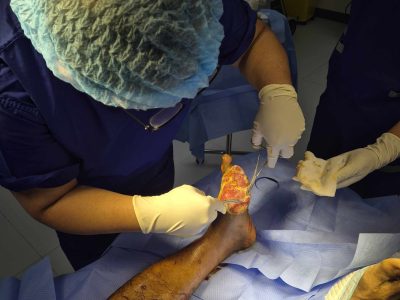Foot wounds that do not heal in people with diabetes are more than just painful—they can threaten overall health, mobility, and independence. Diabetes often affects circulation and nerve function, which delays healing and increases the risk of infection. When wounds persist, the right approach is not only wound care but also orthopedic expertise to restore balance, protect tissue, and improve long-term foot function. That is why Orthopedic Treatment for Foot Wounds that Won’t Heal in Diabetes is essential for reducing complications and supporting a patient’s overall well-being.
Understanding Diabetic Foot Wounds
Diabetes creates unique challenges for the feet. Poor circulation limits blood flow to the extremities, which reduces the body’s ability to deliver nutrients and oxygen needed for healing. Neuropathy, or nerve damage, makes it difficult for patients to feel pain or detect injuries early. As a result, small cuts or blisters can go unnoticed, develop into ulcers, and become infected.
Another factor is the pressure on specific areas of the foot. Repetitive stress from walking, tight footwear, or misaligned bones can worsen wounds and slow down the healing process. When these issues are combined with impaired immunity, wounds may remain open for weeks or even months. That is where Orthopedic Treatment for Foot Wounds that Won’t Heal in Diabetes becomes vital—it addresses not only the wound itself but also the structural and functional problems contributing to delayed healing.
Risks of Untreated Foot Wounds in Diabetes
A diabetic foot wound is never something to ignore. Left untreated, it can progress rapidly and cause life-changing consequences. Small injuries can develop into deep ulcers that damage skin, soft tissue, and even bone. The most dangerous complication is infection, which spreads quickly in diabetic patients and can lead to gangrene.
Untreated wounds may also limit mobility. Pain, swelling, or instability in the foot can make walking difficult, leading to reduced independence and diminished quality of life. In severe cases, amputation becomes necessary to save a patient’s life. These outcomes highlight why early and specialized care, such as Orthopedic Treatment for Foot Wounds that Won’t Heal in Diabetes, is critical for prevention and recovery.
Role of Orthopedic Specialists in Treatment
Orthopedic specialists bring a unique perspective to diabetic wound care. While traditional wound management focuses on cleaning and dressing injuries, orthopedic care goes deeper by examining how bones, muscles, tendons, and joints contribute to the condition. By assessing musculoskeletal health, circulation, and nerve response, orthopedic specialists can identify the root causes of delayed healing.
Key contributions of orthopedic care include:
- Protecting tissue integrity by addressing pressure points and correcting foot alignment
- Preventing complications such as deformities, joint stiffness, or further breakdown of tissue
- Supporting mobility with customized braces, footwear, and exercise plans
- Offering targeted therapies that restore balance and function
This comprehensive approach is why Orthopedic Treatment for Foot Wounds that Won’t Heal in Diabetes is often more effective than wound care alone.
Orthopedic Treatment for Foot Wounds that Won’t Heal in Diabetes at OPTCI
At OPTCI, treatment for diabetic foot wounds is both thorough and patient-centered. Every patient receives an individualized plan that considers the wound, the musculoskeletal system, and lifestyle factors. The care team emphasizes prevention as much as healing, ensuring patients gain long-term relief and protection against recurring injuries.
Comprehensive Evaluation: The process begins with a detailed assessment of the wound, surrounding tissues, circulation, and nerve function. Orthopedic specialists also evaluate bone alignment and weight distribution to identify areas of high pressure that may prevent healing.
Targeted Wound Care: While cleaning, dressing, and infection management are important, orthopedic teams at OPTCI go further by combining wound care with musculoskeletal treatment. This dual approach promotes healing while also preventing new wounds from forming.
Manual Therapy and Muscle Support: Muscles and tendons around the feet are strengthened through manual therapy, stretching, and guided mobility techniques. This restores balance, reduces strain, and improves blood flow to the affected area.
Customized Exercise Programs: Patients benefit from carefully designed exercise routines that improve circulation, build strength, and enhance flexibility. These exercises are tailored to minimize stress on the wound while encouraging healing.
Lifestyle and Foot Care Education: Education is a core part of Orthopedic Treatment for Foot Wounds that Won’t Heal in Diabetes at OPTCI. Patients learn proper daily foot inspection, the importance of well-fitting shoes, and strategies to avoid pressure injuries. This empowers individuals to take control of their recovery and reduce the risk of future wounds.
Benefits of Choosing Orthopedic Treatment for Diabetic Foot Wounds
Patients who receive orthopedic care experience significant advantages, including:
- Faster healing outcomes supported by musculoskeletal intervention
- Reduced risk of infection and other complications
- Greater protection of tissue and prevention of re-injury
- Improved balance, walking ability, and overall mobility
- A holistic treatment plan that addresses both physical healing and quality of life
These benefits make Orthopedic Treatment for Foot Wounds that Won’t Heal in Diabetes one of the most reliable approaches to managing this serious complication.
OPTCI’s Patient-Centered Approach
Every patient at OPTCI receives individualized attention. The team understands that no two cases of diabetic foot wounds are exactly the same, so treatment is carefully tailored to fit each person’s needs. Compassion, innovation, and expertise are combined to create effective recovery pathways.
What makes OPTCI stand out is the balance of medical excellence with personalized support. Patients are guided through each stage of recovery, ensuring not only physical healing but also improved confidence, independence, and emotional well-being.
Tips for Preventing Diabetic Foot Wounds
Even with the best care, prevention remains the most effective strategy. Simple steps can reduce the risk of wounds and complications:
- Perform daily self-checks to look for cuts, blisters, or skin changes
- Wear comfortable, properly fitted footwear to avoid pressure sores
- Keep blood sugar under control to promote better circulation
- Exercise regularly to stimulate blood flow and maintain joint health
- Seek orthopedic care promptly when a wound does not improve
These preventive habits, paired with Orthopedic Treatment for Foot Wounds that Won’t Heal in Diabetes, offer the strongest protection against serious complications.
When to Seek Help Immediately
Delays in treatment can make the difference between recovery and severe complications. Patients should seek immediate orthopedic care if they notice:
- Signs of infection such as redness, swelling, warmth, or discharge
- Wounds that remain open for more than two weeks
- Severe or persistent foot pain
- Sudden changes in walking ability or stability
- Fever or overall unwellness linked to a wound
Early intervention with Orthopedic Treatment for Foot Wounds that Won’t Heal in Diabetes significantly improves outcomes and protects long-term health.
Takeaway
Foot wounds that do not heal in diabetes require urgent and specialized care. Beyond traditional wound management, orthopedic expertise provides the missing link—addressing bone, muscle, and tissue health to support full recovery. At OPTCI, Orthopedic Treatment for Foot Wounds that Won’t Heal in Diabetes is patient-focused, effective, and designed to restore both mobility and independence. Seeking timely orthopedic care not only prevents complications but also gives patients the best chance at regaining a fulfilling, active lifestyle.
FAQ Section
What makes diabetic foot wounds difficult to heal?
Diabetes affects circulation and nerve function, reducing the body’s ability to repair tissue. This often results in wounds that remain open and prone to infection.
How does orthopedic treatment help compared to standard wound care?
Orthopedic treatment goes beyond cleaning and dressing. It addresses musculoskeletal issues, pressure points, and mobility factors that contribute to slow healing.
What are the risks of delaying treatment for a diabetic foot wound?
Delays increase the risk of infection, ulcers, gangrene, and even amputation. Early orthopedic care provides better outcomes.
Can physical therapy improve healing for diabetic foot wounds?
Yes, targeted exercises and manual therapy improve circulation, restore balance, and reduce strain on affected areas, which supports healing.
How does OPTCI customize treatment for each patient?
OPTCI creates individualized plans that combine wound care, orthopedic intervention, exercise programs, and lifestyle education tailored to each patient’s condition and goals.







